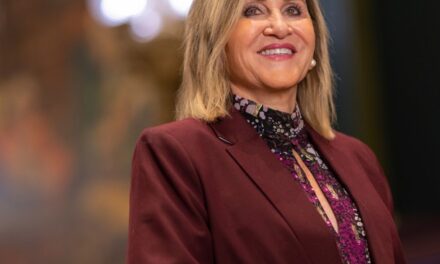
In her new book, When Black Women Rise, LaTresse Snead offers insight and advice for people, especially Black women, who are—or are striving to become—industry leaders.
Interspersing that counsel with the telling of her own life story, Snead describes the challenges and opportunities she encountered in her journey from a working-class Black background to having a seat at the table of powerful and wealthy nonprofit institutions.
When Black Women Rise seeks to condense those lessons into a concise guide for Black women navigating the challenging, often hostile, and sometimes outright racist environments they may encounter on their own journeys to leadership—and gives advice on everything from moving past fear to developing “executive presence” to learning how to “fail forward” when inevitable obstacles arise.
Snead is CEO and founder of the Bonsai Leadership Group, a consulting, executive coaching, and leadership recruitment firm serving nonprofit institutions focused on “creating racially diverse candidate pools for considerations to positions of power within the nonprofit sector.”
Prior to founding that company, Snead served as a senior leader and fundraiser for organizations including the Boys & Girls Clubs of America, Mothers Against Drunk Driving, the American Red Cross, the Nature Conservancy, and the National Park Foundation, helping to raise and influence more than $200 million in donations among those nonprofits.
In this interview with NPQ, Snead expands on why she wrote the book, what she hopes to convey to Black women leaders, and how she grades the nonprofit sector on its fulfillment of promises of increased attention to diversity, equity, and inclusion, especially following the 2020 murder of George Floyd.
NPQ: What were the concepts and messages you were most excited about communicating in this book?
LaTresse Snead: First, I want to just share my perspective as a Black woman in the nonprofit space. Over the years of being in the nonprofit sector, it was funny, I would come across other Black women executives working in this space and ask, “Am I wrong about this?” And we would have that chance to share experiences and validate each other. So, I wanted to write something that would validate other Black women in the space to say, you know, you might have felt this way or had a similar experience.
NPQ: You write, especially addressing Black women, about the importance of using your voice, not holding back, and the challenges Black women face in doing that. Where do those challenges come from, and why is it so important not to hold back?
LS: I think a lot of it is rooted in racism, that Black people just need to be quiet, listen, not raise your voice, not be seen as the angry Black woman.
“I wish I had found my voice a little bit earlier.”
Growing up, my mom would say, “Make sure you’re wearing your Sunday’s best.” You always have to dress better, look better, show up better in spaces that are predominantly White so that people won’t make certain judgments about you. And those judgments come when you have to speak up.
So, do you speak up? Is someone going to say, “Oh, you’re just saying that because you’re Black?” I’ve heard that before. It’s like this mark on you that you can’t ever shake. I think the other thing is the fear of even losing your job if you say something, you speak up and people don’t like it.
I think it’s rooted a lot in this history and how Black people have had to show up in the past to protect themselves. As I’ve gotten older and less fearful, I wish I had found my voice a little bit earlier.
“As executives, we think we have to have all of the answers—but we don’t.”
NPQ: What is “executive presence” and what does it mean to you?
LS: To me, executive presence is really complicated, but it comes down to when you show up in a room, how do you project that confidence that you know what you’re talking about? If I am the executive director of ABC organization, do people really feel confident that I am the thought leader in the room? Not that I have all the answers, but that I’m confident enough to say “I don’t know. What do you think?” So, that’s that vulnerability piece, right? Because I think that a lot of times as executives, we think we have to have all of the answers—but we don’t have to have all of the answers.
Sign up for our free newsletters
Subscribe to NPQ’s newsletters to have our top stories delivered directly to your inbox.
By signing up, you agree to our privacy policy and terms of use, and to receive messages from NPQ and our partners.
NPQ: You write about taking risks throughout your life and your professional career. You seem to be generally pro-risk. But isn’t taking risks…well, risky?
LS: I think when I was younger, I was more risky! But I’ve always thought about how to take a calculated risk. I ask, if this doesn’t work out, what is the worst that can happen? And if I know the worst that can happen and I can solve for that, then I feel like it’s a comfortable risk.
And I think every time I’ve taken those risks, where they have been calculated and well thought out, they have served me well. Nothing has been perfect in those times, but I was always able to advance.
“If you never take a risk in life, you never know what could be different or what could be better.”
Starting this business was a huge risk. And sometimes I have women who say, “I want to take that step, too.” And I always say, when you think about what you want to do, think about whether you can do it for at least a year and just focus in on that. And if so, how can you do that comfortably? What do you need to have in place?
And sometimes, I think the first thing that a lot of women, at least the women I talk to, say [is], “Oh, you know, I make X amount now. I would need to make that in the next year.” And I’m like, do you really? What if you didn’t? Have you really done a budget to see what are the basic needs? If I just had the basic needs met over the next year, how much would that be? And some people have been really surprised to realize: Oh, I actually don’t need that much, I’m going to take this risk. If you never take a risk in life, you never know what could be different or what could be better, you know?
NPQ: You talk about the difference between mentors and “sponsors,” and the importance of trying to find and cultivate the latter kind of relationship. What is a sponsor, and why is it beneficial to have one?
LS: I didn’t know what a sponsor was until I got one. I had heard about mentors. A mentor really tells you about their experience. They give you advice on your experience. But a sponsor…does some of those same things, but they go into rooms that you’re not in and they advocate for you. They are willing to take a risk to elevate you to others. So, my sponsor would always give me great feedback and support. But I found out later that when he was on the executive team and he would be in rooms with the other executive members, he’d be saying, “Why isn’t LaTresse doing something else in this organization? She could have a bigger impact in this way and she should have this opportunity.” And that was behind closed doors. He didn’t tell me, “I’m going to go tell them this.” I had no idea. He just did it. That’s a sponsor.
NPQ: You have had a front row seat to see how nonprofits have and have not upheld promises made, especially around the 2020 “racial reckonings,” to make greater investments in diversity, equity, and inclusion. There’s a lot of evidence that suggests many of those promises haven’t been kept, or at least haven’t been fully embraced. Why hasn’t there been more progress?
LS: A lot of those decisions come down to whether or not the CEO or top executive wants that change to happen in their organization and how much support they have from their board.
So, I’ve seen some executives say, “This is really important to us,” and then you have boards that are saying, “That’s mission drift. We shouldn’t be focused on that. We shouldn’t invest in that.”
Then you have the tension of a of a CEO or executive that really does not want to even broach the subject for many different reasons. Maybe they don’t care about it. Maybe they’re scared of doing something wrong or saying something wrong or not being able to move the needle. So, they do nothing.
And then you have those that are forced to do something that don’t really want to do it, but their staff is demanding, “We need change, we need change.” And I think that’s where you see a lot of those performative actions, where they’ll say, we’ll hire a DEI person and not give them a budget or staff, not support them, but at least we can tell the staff that we have a DEI person.
But then I think there is a core group of people out there that really, truly, honestly want to see change within their organizations. But unless that executive director and that board support that change, it is going to turn out to be performative, or nothing will happen at all.
The organizations that I work with come to me saying, “We’re hiring for this position and we’re tired of going to our same networks, getting the same people. And we want a more diverse pool of candidates to choose from.” And I love to hear that. [But] if I don’t hear that [the executive director and the board are truly invested in change], I don’t work with them. All money is not good money.





